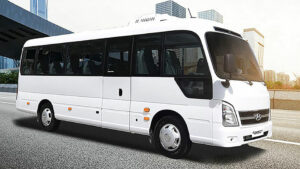HARIPHIL ASIA Resources, Inc. (HARI), the Philippine distributor of Hyundai trucks and buses, said it hopes to sell 700 units this year, driven by the government’s public transport modernization program.
“Last year, we achieved 27% growth … and this year we are looking at 700 units for all the models that we have launched,” HARI President and Chief Executive Officer Maria Fe Perez-Agudo told reporters on Friday.
“But as you very well know, we are also dependent on the support of the government for the modernization program. If the funding is released earlier, then we could move faster with our orders from the cooperatives,” she added.
As of May, she said that the company has achieved 25% of its target due to challenges with the modernization program.
“We believe that the Department of Transportation is working on a resolution because we have a queue of orders from cooperatives that are sufficient to hit more than 100% (of the target),” she said.
“So far, we have a queue of over 1,000 units, but as I have said, the screening process is very meticulous. It really is a test of financing capability and, of course, the credibility of the cooperatives” in paying off their loans, she added.
On Friday, the company introduced its lineup of electric commercial vehicles, led by the Hyundai Mighty Electric and Hyundai County Electric, alongside a locally assembled internal combustion engine-powered commercial vehicle, known as the HARI Cab.
“We just launched the electric vehicles (EVs) today, and we will continue to promote and create more awareness of the significance of moving to EVs,” she said.
“We expect an amazing acceptance of our Hari Cab. So the sales report by the end of June will capture the performance of the Hari Cab,” she added.
She said that the company is also planning to introduce more EV variants, though it will take time before EVs capture a bigger share in the truck segment.
“It will take time. The government has its conservative and aggressive targets. But as you have seen in the passenger car, it is already moving; it has captured a certain market share, but the infrastructure rollout remains slow,” she said.
“We will progress as the infrastructure grows. That’s the challenge for the private and public sectors — to improve the logistics and infrastructure development, which is the charging stations,” she added.
She said the success of its EV lineup will also depend on the government’s 5-10% quota for EVs in corporate and government vehicle fleets.
“We hope that the government will increase that target as the infrastructure continues to increase because there should be some sense of balance between infrastructure development and availability of EVs,” she added.
Asked if the company is planning to manufacture the cars in-country, she said that the focus should first be on the battery.
“I think everybody should concentrate on batteries right now because even if you manufacture these cars, if there is no battery supply, then it will be challenging … The issue is how to resolve range anxiety,” she said.
“The Philippines is well-placed right now to take advantage of some other issues that are happening around the world and capture business from other parts of the world,” she added. — Justine Irish D. Tabile
